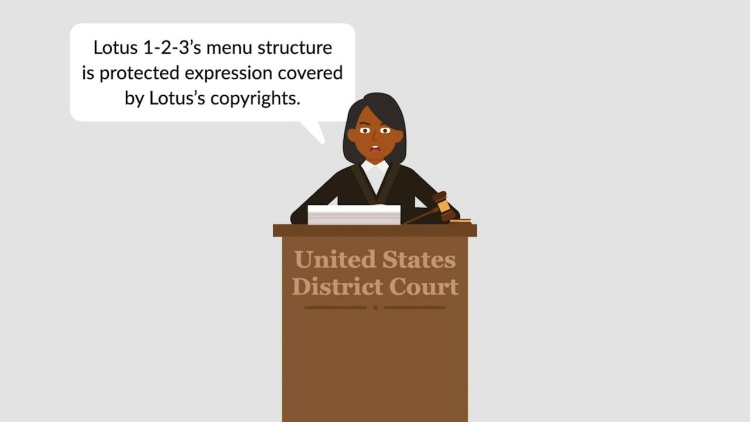Lotus Development Corp. v. Borland International
United States Court of Appeals for the First Circuit
49 F.3d 807 (1995), aff'd by an equally divided Court, 516 U.S. 233 (1996)

- Written by Sean Carroll, JD
Facts
Lotus Development Corp. (Lotus) (plaintiff) developed a computer menu command hierarchy that allowed users to operate Lotus’s computer spreadsheet program, called Lotus 1-2-3. Specifically, the hierarchy allowed users to enter a command, such as “copy” or “print,” and the program would carry out the corresponding function. It was not possible to operate Lotus 1-2-3 without the hierarchy. Borland International (Borland) (defendant) copied Lotus’s menu command hierarchy to create its own computer program. Lotus brought suit against Borland for copyright infringement. The United States District Court for the District of Massachusetts (District Court) held that Borland infringed on Lotus’s copyright because Lotus’s command terms could be easily be altered (i.e., “quit” could easily be called “exit) with no change in functionality. As a result, according to the District Court, Lotus’s arrangement and naming of its menu tree was copyrightable. Borland appealed.
Rule of Law
Issue
Holding and Reasoning (Stahl, J.)
Concurrence (Boudin, J.)
What to do next…
Here's why 907,000 law students have relied on our case briefs:
- Written by law professors and practitioners, not other law students. 47,100 briefs, keyed to 996 casebooks. Top-notch customer support.
- The right amount of information, includes the facts, issues, rule of law, holding and reasoning, and any concurrences and dissents.
- Access in your classes, works on your mobile and tablet. Massive library of related video lessons and high quality multiple-choice questions.
- Easy to use, uniform format for every case brief. Written in plain English, not in legalese. Our briefs summarize and simplify; they don’t just repeat the court’s language.





